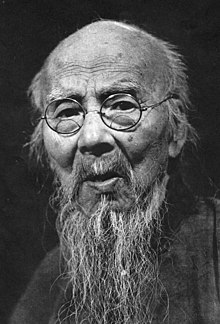Qi Baishi | |||||||||
|---|---|---|---|---|---|---|---|---|---|
 Photo portrait of Qi Baishi in 1956 | |||||||||
| Born | 1 January 1864 | ||||||||
| Died | 16 September 1957 (aged 93) Beijing, China | ||||||||
| Known for | Painting | ||||||||
| Chinese name | |||||||||
| Traditional Chinese | 齊白石 | ||||||||
| Simplified Chinese | 齐白石 | ||||||||
| |||||||||
Qi Baishi (1 January 1864 – 16 September 1957) was a Chinese painter, noted for the whimsical, often playful style of his works. Born to a peasant family from Xiangtan, Hunan, Qi taught himself to paint, sparked by the Manual of the Mustard Seed Garden. After he turned 40, he traveled, visiting various scenic spots in China. After 1917 he settled in Beijing. Qi was the master of Hu Jieqing, the wife of Lao She.
The subjects of his paintings include almost everything, commonly animals, scenery, figures, toys, vegetables, and so on. He theorized that "paintings must be something between likeness and unlikeness, much like today's vulgarians, but not like to cheat popular people". In his later years, many of his works depict mice, shrimp or birds. He was also good at seal carving and called himself "the rich man of three hundred stone seals" (三百石印富翁). In 1953, he was elected president of the China Artists Association (中國美術家協會). He died in Beijing in 1957.